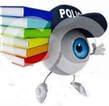
Ah, Ha! At last, the Literary Police have rooted out the culprit. It is now time for the Father of the Cliché to take his punishment. William Shakespeare, please stand up and face judgment!
“Most Influential Writer in the English Language”
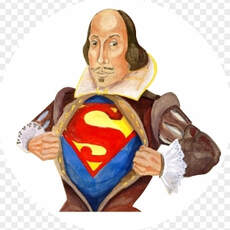
[Hamlet, Act 1, Scene 3]
William Shakespeare (baptized 26 April,1564 – 23 April, 1616) was the English playwright, poet and actor who is widely regarded as the greatest writer in the English language and the world's pre-eminent dramatist.
Born and raised in Stratford-upon-Avon, England, his career began in London as an actor. He was soon renowned as a significant playwright and poet as well, and his influence on the English language has extended far beyond that time period and straight into our modern age.
Now a private residence
Image Source: dreamstime.com/stock-photos-stratford-shakespeares-birthplace
Even after four hundred plus years, and the advent of some pretty great writers, he remains arguably the most influential writer in the English language, and his works continue to be studied and reinterpreted.
Shakespeare has a special knack for bringing to the surface the inherent human weaknesses that drive most of his writings. The best of his tragedies exhibit these well. In addition to his impact on writing and the handling of content, his works contributed significantly to the standardization of grammar, spelling, and vocabulary.
EVERYONE HAS A PAST
Everyone and everything has a past, including the English language.
Ever since the first remnants of spoken language appeared somewhere around 50,000 years ago, languages have diverged into various veins which have since evolved into the 6,500 languages we have today.
According to the Encyclopedia Britannica, English “really took off” in the 5th century when three Germanic tribes [the Angles, Saxons, and Jutes] crossed the North Sea and invaded Britain. Up until that point the inhabitants of Briton spoke dialects of the Celtic language. The invasions drove many of the Celts north to what is now Scotland, Wales, and Ireland where dialects of the Celtic language survived.
● Old English
Old English developed during the period between the 5th and the 11th centuries, beginning with the invasion of the Germanic tribes. Throughout the 8th to 10th centuries, England experienced invasions from Viking tribes, ending with the (French) Norman invasion of England in 1066.
The word England and English originated from the Old English word Engla-land, literally meaning “the land of the Angles” where they spoke Englisc. Old English is largely unintelligible to speakers and readers of modern English. For Example:
“Fæder ure şu şe eart on heofonum, si şin nama gehalgod” translates to ““Our father which art in heaven, hallowed be thy name”, the first line of the Lord’s prayer. shortform.com/blog/evolution-of-english-language/
Old English gradually supplanted the old Latin and Celtic influences in England. Interestingly, the latter linguistic traditions left few personal or place-names today have Latin or Celtic antecedents.
● Middle English
Norman French, not English, was the language of the ruling elite in England for centuries after the Norman Conquest. Largely left to its own devices, English developed organically during the Middle Ages. Although Middle English suffered from lack of standardization, it is when English developed many of its more recognizable features.
By the mid-14th century, English had reasserted itself as a language of government and law, due to the fact that the political links between England and France were severed over the course of the centuries. Moreover, there was a shift in the character of written English. Although Medieval English dialects could vary widely even across short distances, the language was becoming more standardized. That process was long and uneven, but the spoken language started to sound more like the present-day English language.
● Early Modern English
The changes in the English language during this period occurred from the 15th to mid-17th Century, and signified not only a change in pronunciation, vocabulary and grammar itself but also the start of the English Renaissance.
The printing press, first introduced in England by William Caxton in 1476, allowed Early Modern English to become mainstream. The printing press was key to standardizing the English language through distribution of the English Bible.
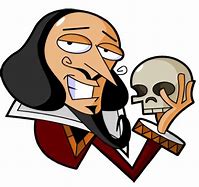
THE BARD ARRIVES
Onto this scene bursts one William Shakespeare. At the time William Shakespeare did most of his writings [1589 thru 1613], the English language was undergoing serious changes due to contact with other nations through war, colonization, and the likes. No dictionaries had yet been written and most documents were still written in Latin.
These changes were further cemented through Shakespeare and other emerging playwrights who found their ideas could not be expressed through the English language currently in circulation. Thus, the “adoption” of words or phrases from other languages were modified and added to the English language, creating a richer experience for all concerned.
The Bard is credited for having contributed 1,700 words to the English language because he was the first author to write them down. At least as many phrases, and probably more, originated in his works and expressed ideas in new ways.
Where ever they came from, Shakespeare wrote down new words and phrases and was able to share them with the general public through the theater. They stuck and many became popular. Over the last four hundred years English speakers and writers have used them ad infinitum.
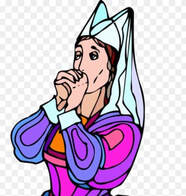
Without realizing it, you probably quote Shakespeare more often than you believe. English speakers can’t hold a conversation without a quote or two. Take a look at the abbreviated list of words and phrases that Shakespeare was first to conceive of, say, use in a particular form, use with his particular meaning, and so on. And the most important thing, he wrote them down and communicated them.
As well as inventing completely new words, he used existing words in inventive new ways. For example he was the first person to use 'friend' as a verb, as well as 'unfriended’ (Twelfth Night) and from 'gloom' he invented the word 'gloomy' (Titus Andronicus).
The following is an abbreviated list of words and phrases Shakespeare coined in this plays. They are in no particular order.
| ● all that glitters isn’t gold ● all the world’s a stage ● archvillian ● as good luck would have it ● assassination ● at one fell swoop ● a tower of strength ● a foregone conclusion ● a tongue in your head, ● a laughing stock ● a sorry sight ● a stony-hearted villain ● bloody-minded| ● a blinking idiot ● by jove ● barefaced ● be all and end all ● be that as it may ● bedazzled ● been hoodwinked ● been in a pickle ● belongings, ● break the ice ● breathe one’s last ● brevity is the soul of wit ● but me no buts ● catch a cold ● cold-blooded ● cold comfort ● clothes make the man ● danced attendance on your lord and master ● disgraceful conduct ● dog will have his day ● dead as a doornail ● eyesore ● eaten out of house and home ● elbow room ● eventful ● fair play ●fancy-free ● flesh and blood ● flaming youth ● foregone conclusion ● for goodness sake ● fool you, for it is ● foul play ● frailty, thy name is woman ● give the devil his due ● good riddance ● gone in the twinkling of an eye ● green eyed monster ● had short shrift ● heart of gold ● heartsick ● hot-blooded ● housekeeping ● inaudible ● in a pickle ● in stitches | ● it smells to heaven ● it’s Greek to me ● it is all one to me ● it is high time ● knitted your brows ● lackluster ● laughed yourself into stitches ● leapfrog ● lie low ● live long day ● lived a fool’s paradise ●long-haired ● made a virtue of necessity ● manager ● method in his madness ● mind’s eye ● ministering angel ● more sinned against than sinning ● more in sorrow than in anger ● mum's the word ● naked truth ● neither a borrower nor a lender be ● neither here nor there ● o lord ● one fell swoop ● outrageous fortune ● pitched battle ● primrose path ● played fast and loose ● seen better days ● send me packing ● slept not one wink ● stood on ceremony ● strange bedfellows ● swagger ● the course of true love never did run smooth ● teeth set on edge ● that is the long and the short of it ● the devil incarnate ● the lady doth protest too much ● the milk of human kindness ● the game is up ● the truth will out ● the world’s your oyster ● to give the devil his due ● to budge an inch ● tongue-tied ● towering passion ● too much of a good thing ● till the crack of doom, ● tut, tut! ● uncomfortable ● vanished into thin air ● what the dickens ● wear one’s heart on one’s sleeve ● witching time of the night ● without rhyme or reason ● your wish is father to the thought ● There's method in my madness ● Wild-goose chase |
How many cliché phrases can you pick out of the list? No insult intended to the list of clichés I used, but c’mon. How can the phrases “Clothes make the man,” “In one fell swoop,” or “Strange bedfellows” not be cliché?
Image Source: pinterest.com/pin/17310779793801123/ Image Source: bookpalace.com/acatalog/info_BeavenTheatreLL.html
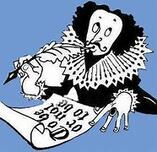
To put things in context, remember that in Elizabethan England the live stage was the mass entertainment of the people. That’s important for two reasons. First, because these plays were considered by the more elite population as low-brow and rather crude, sort of like mud-wrestling, and definitely not considered high art. Yet Shakespeare wrote for those who were educated and those who were not. The educated would understand his subtle jokes about politics, the court, and the double entendre of the more common words with sexual meanings. The “groundlings” appreciated the more vulgar jokes.
And indeed, Shakespeare’s uncensored plays were rife with “sexual language full of innuendo and rudeness” and the commoners loved it. rsc.org.uk/shakespeare/language/slang-and-sexual-language
Second, theater was the only source of public entertainment of this sort, and to keep the customers coming, the playhouses needed a lot of playwrights and new material all the time. The playwrights had plenty of competition. Not being “high art”, plays were disposable. Scripts belonged to the play houses which had little motivation to make copies for someone to flitch. Often playwrights collaborated on scripts for the theater and might not get credit for their work.As early as 1598 Shakespeare was lauded by others for his work and his reputation as a playwright and poet grew. Even His greatest contemporary rival, Ben Johnson, praised his comedies but took issue with his tragedies. While he received a large amount of praise, Shakespeare was certainly not revered in his lifetime, and others claimed he “wanted art”, meaning he lacked skill.
Because of the publication of Shakespeare’s “First Folio” ‒ a collection of his plays‒ published seven years after his death (1623), the Bard had a huge advantage over his peers whose works have largely been lost to posterity.
“BEWARE OF JEALOUSY: IT IS THE GREEN-EYED MONSTER”
“Around 230 years after Shakespeare's death, doubts began to be expressed about the authorship of the works attributed to him. Proposed alternative candidates include Francis Bacon, Christopher Marlowe, and Edward de Vere, 17th Earl of Oxford. Several "group theories" have also been proposed.
All but a few Shakespeare scholars and literary historians consider it a fringe theory, with only a small minority of academics who believe that there is reason to question the traditional attribution, but interest in the subject, particularly the Oxfordian theory of Shakespeare authorship, continues into the 21st century."
https://en.wikipedia.org/wiki/William_Shakespeare
JUST SAYIN’ !
□
Sources:
https://www.thoughtco.com/list-of-phrases-shakespeare-invented-2985087#:~:text=The%20Most%20Popular%20Shakespearean%20Phrases%20A%20laughing%20stock,Merry%20Wives%20of%20Windsor%29%20A%20sorry%20sight
https://www.bardweb.net/content/ac/shakes-peers.html#:~:text=The%20publication%20of%20the%20First%20Folio%20in%201623,a%20genre%20and%20Shakespeare%27s%20relation%20to%20his%20peers.
https://www.oxfordinternationalenglish.com/a-brief-history-of-the-english-language/
https://www.thoughtco.com/events-history-of-the-english-language-1692746
https://www.thoughtco.com/top-shakespeare-quotes-2833137
https://www.languagetrainers.com/blog/shakespeare-still-has-it-10-words-he-invented-which-we-still-use-today/#:~:text
https://nosweatshakespeare.com/resources/shakespeare-phrases/
https://en.wikipedia.org/wiki/William_Shakespeare
https://englishliterature.education/william-shakespeare/#:~:text
https://www.rsc.org.uk/shakespeare/language
https://www.rsc.org.uk/shakespeare/language/slang-and-sexual-language
https://theshakespearean.com/educational-resources/lesson-plans/the-language-of-shakespeare/#:~:text
https://www.grammarly.com/blog/how-the-english-language-is-shakespeares-language/
https://www.teck-translations.com/how-shakespeare-changed-the-english-language/
https://www.shortform.com/blog/evolution-of-english-language/
https://www.dreamstime.com/stock-photos-stratford-shakespeares-birthplace-image1890493
https://writers.com/how-to-avoid-cliches-in-writing#:~:text=
https://www.bardweb.net/content/ac/shakes-peers.html#:~:text=
https://www.sparknotes.com/shakespeare/life-and-times/critical-reputation/
https://www.goodreads.com/author/quotes/947.William_Shakespeare
https://www.historyanswers.co.uk/medieval-renaissance/2-million-copy-of-shakespeares-first-folio-discovered/
https://www.msn.com/en-us/entertainment/news/10-of-shakespeare-s-most-famous-quotes/ar-AA15spbK#:~:text=What%20are%20Shakespeare%E2%80%99s%20most%20fa
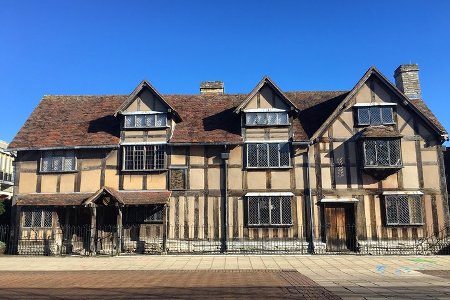
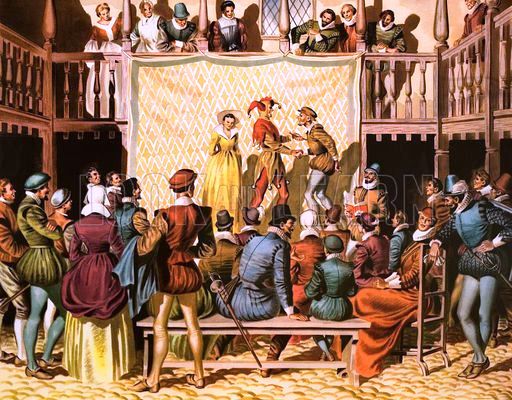


 RSS Feed
RSS Feed